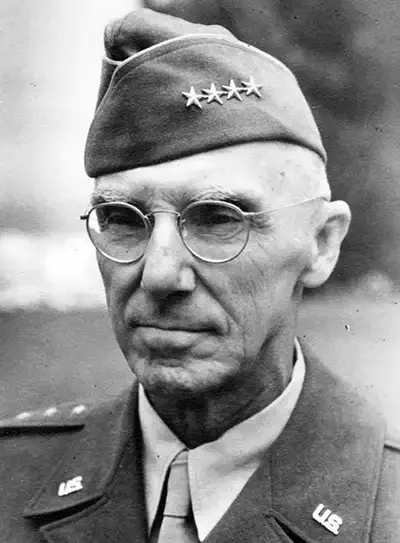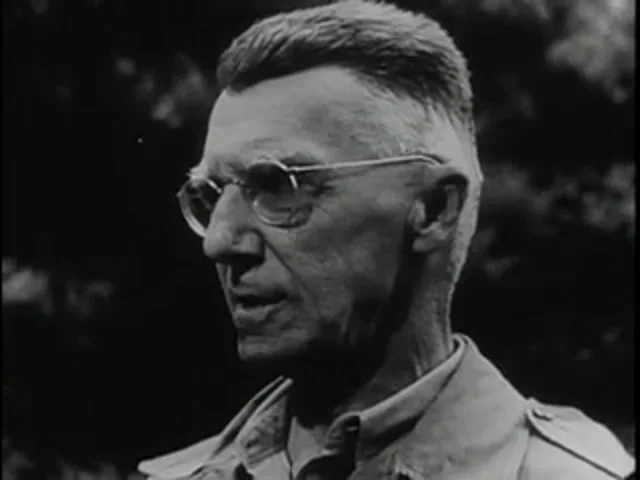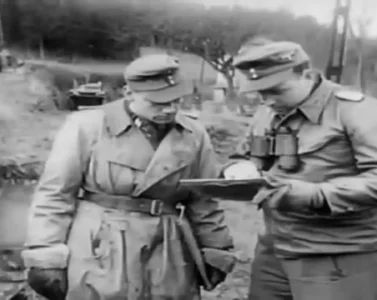- Military History
- Biographies
- Militarians Biographies
- General Joseph Warren Stilwell
General Joseph Warren Stilwell
Known in China as Shih Ti-wei, his caustic personality was reflected in the nickname "Vinegar Joe"
Joseph Warren Stilwell was born on March 19, 1883, in Palatka, Florida and grew to know more about China than anyone else in the United States Army. Two decades before World War II, he spent four years studying Chinese art, literature, and language, and its military history. Years later, his two daughters gained similar interests. One was a musician who performed Chinese music; the other was a painter who imitated the style of Chinese artists.
But Stilwell also admired the Chinese military. After graduating from West Point Military Academy in 1904, he served in Tientsin (Tianjin), China from 1926 to 1929, and was a military attaché in Peking from 1935 to 1939. After spending these years stationed in China, Stilwell said, "The Chinese soldier is one of the best in the world. If he has the equipment and supplies, no one can lick him."' Nine days after the attack on Pearl Harbor, Japanese forces invaded Burma. The small Asian country was a British colony between India and China. The Japanese hoped to gain control of Burma so they might cut off the flow of supplies from the British in India to the forces of Generalissimo Chiang Kai-shek in China.
Chiang was an ally of the United States and Great Britain, but he had more to worry about than just the Japanese threat to his nation. His rule was being threatened by Mao Zedong and the Chinese Communists, who wanted to take over their country from Chiang and the Nationalists. Supplies from the Allies made their way to Chiang from Rangoon along the Burma Road. It was this link the Japanese hoped to cut. The small Burmese army could not slow the invaders. They sent Stilwell back by his American commanders to take charge of Chinese troops early in 1942. By then, the situation was hopeless. The Japanese had taken just five months to conquer Burma. Stilwell, a quarrelsome man who wasn't afraid to state his opinions, was nicknamed "Vinegar Joe" for his sour disposition. His description of the Allied defeat was terse:
"The Japs ran us out of Burma. We took a beating!"
He did not enjoy losing.
"It is humiliating-I think we ought to find out what caused it, go back and retake it."'
But before he and the Allies could come up with a strategy to retake Burma, they had to escape the victorious Japanese by fleeing to China or India.
Lieutenant General William Slim led the British troops on a long, hot retreat through central Burma into India. Throughout the march, he encouraged his men and won their respect and affection. They called him "Uncle Bill." Slim's strategy did not please Stilwell. He thought the British had retreated so quickly that his troops were left alone to face the invaders. He had to retreat 150 grueling miles through the jungle with a small band of troops and a few Burmese nurses. The American general wasn't known for his personal warmth. He didn't spend his time encouraging his men or trying to boost their spirits; he concentrated on keeping them moving. Almost immediately, they had to give up their trucks and jeeps; the jungle trails were too narrow for them. There was no way to escape except on foot.
"We will all stay together in one group," he told them. "But I insist on discipline. If anyone does not want to accept my orders without question, he'd better speak up right now—and go his own way.”
Nobody spoke up. They marched fifty minutes, rested ten, then got up and marched again. Many times, the jungle trails disappeared, and it was impossible even to walk through the thick growth. Stilwell led his men down to the Chaung-gyi River, where they splashed ahead until finding another opening in the jungle. Despite the rough terrain and the heat, Stilwell's troops could average about fifteen miles a day. After seventeen days, they reached the safety of Imphal, India. The general said he would never forget the march. "I'm keeping it right in my mind until the day we march into Tokyo.” With no more land link to China, the Allies had to supply the Chinese leader Chiang Kai-shek from the air.
Thousands of planes made the dangerous flight from Assam, India, to China. They flew several thousand Chinese troops to India to join what was left of Stilwell's forces. He and the British generals began planning a strategy to reopen the Burma Road. Some Allied leaders felt it would be foolish to fight the Japanese on the ground.
"Why not just try to bomb them out of Burma? Winston Churchill said. Going into the swampy jungles to fight the Japanese is like going into the water to fight a shark.” - Stilwell disagreed: "It's the ground soldier slogging through the mud and fighting in the trenches who will win the war.”
Stilwell got his way and could approve an ambitious plan to construct a 478-mile (770km) road through rugged mountains from Ledo, India, to Myitkyina, Burma. There it would join the Burma Road and once again there would be a pathway for troops and supplies into China. It would be tough enough to build such a road in peacetime, but construction could not begin until Allied troops had taken the land back from the Japanese. At first, Stilwell's Chinese troops fought poorly. Chiang had ordered them to go slowly because he wanted them to be fresh in case he needed them to fight against the Chinese Communists. Stilwell was furious. Why, he wondered, were we bothering to supply the Chinese Nationalists when they would not wage an all-out war against the Japanese? But progress was made because of two tough small Allied units.
General Orde Wingate commanded three thousand British soldiers known as "Chindits," named after the Burmese word for a lion. They slipped through the thick jungle in small groups to torment the Japanese. They carried few supplies, usually not even a shaving kit, so many of them wore beards. Because of their light loads and small groups, they could move quickly and stealthily, doing much of their work behind enemy lines. On the American side, General Frank Merrill commanded a similar group of guerrilla fighters known as Merrill's Marauders. Throughout much of the action, the Kachin, a Burmese tribe who knew the jungle well, assisted them. The Americans had to blackmail the Chinese into fighting harder. Chiang was told that unless his troops began waging a serious war against the Japanese, the Allies would withhold the supplies he needed.
In May 1944, the combined Allied forces began closing in on Myitkyina. British troops did much of the heavy fighting. Stilwell continued to push the men hard, who were under his command. Carrying a rifle and ignoring enemy bullets, he sometimes traveled to the front himself. If he wanted his men to be tough, he figured he had to show them he was tough, too. After the death of Wingate, their commander, Stilwell, turned the exhausted Chindits from guerrilla fighters into assault soldiers. They did poorly and took many casualties. At Myitkyina, he did the same thing with Merrill's Marauders. Soldiers who had been marching and fighting almost continuously for six months were thrown against the entrenched Japanese forces. Other troops had to be brought in, and it wasn't until the enemy's supply lines were cut from behind that Myitkyina fell.
As soon as they took the town, construction began on a pipeline that would bring fuel from Ledo. The Myitkyina airfield could then be used for supply flights into China. It was a much safer, more direct route than the ones that had been used since the fall of Burma. Right behind the soldiers came the engineers and workers whose job it was to construct the Ledo road over the captured territory. Much of the work had to be done during the monsoon season, when heavy rains drenched the country. The Americans did not let the thick jungle, the continuing floods, or jungle diseases stop diem. When faced by almost two miles of flooded roadbed, the crews used a million board feet of lumber to build a causeway over the water.
Late in 1943, 80 percent of the workers had malaria. But the work continued because, as General T. F. Farrell explained, "General Stilwell was depending upon the road to supply his winter campaign against the Japanese."' Even when cutting through rugged mountain terrain, the engineers could build a mile of road a day. As the Allies continued to chase the Japanese out of Burma, Stilwell was increasingly frustrated by his dealings with Chiang. The Chinese leader, he felt, was not interested enough in defeating the Japanese. The Nationalists seemed to be more interested in getting rich and fighting the Chinese Communists.
Stilwell complained that much of the aid money pouring into China was going into the pockets of Chiang and his generals and not into buying supplies for their army. Chiang grew tired of listening to Stilwell's complaints. The fighting went on, and they eventually completed the road. It was first named the Ledo Road but was renamed after Stilwell in early 1945. By May the Japanese had been forced out of Burma. The next month, Stilwell took command of the United States Tenth Army of the Pacific and saw one hundred thousand Japanese troops surrender at Ryukyu Islands in August.
After the war, they stationed Stilwell in San Francisco as Sixth Army commander where he died on October 12, 1946. Stilwell helped the Allies win the biggest war in the world's history, but it was not a job he enjoyed.
“War is the most wasteful and immoral device ever contrived by man. It’s always bound to be a dirty game, and it is bound to be played by dirty rules. But whatever happens, we’ve got to win, no matter what the rules.”
General Joseph Warren Stilwell - Quick Facts
- 10th Army (United States 1944-1945)
- 6th Army (United States)
- 7th Infantry Division (United States)
- Army Ground Forces (United States 1942-1945)
- Chinese Expeditionary Force (Burma & India 1942-1945)
- III Corps (United States)
- WWI (1914-1918)
- Second Sino-Japanese War (1937-1945)
- WWII (1939-1945)
- {{#owner}}
- {{#url}} {{#avatarSrc}}
{{name}} {{/url}} {{^url}} {{#avatar}} {{& avatar}} {{/avatar}} {{name}} {{/url}} - {{/owner}} {{#created}}
- {{created}} {{/created}}

























